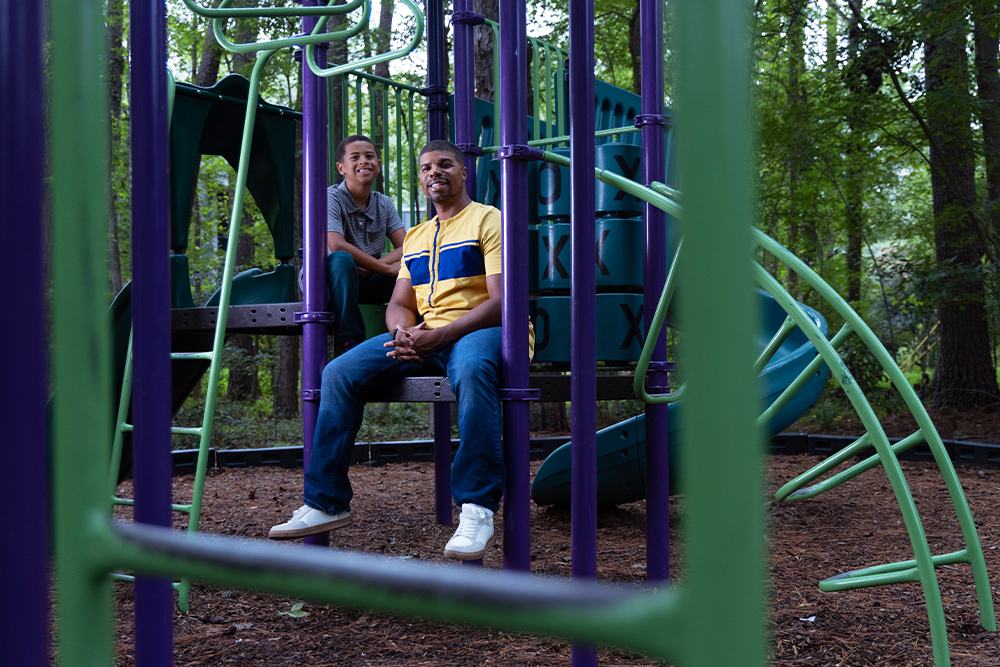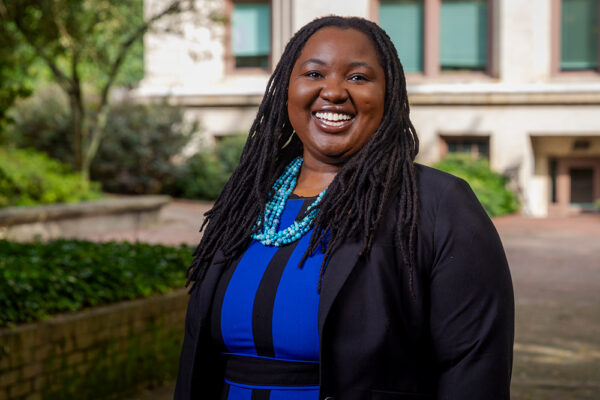Shauna Cooper has spent over a decade studying Black fathers and their roles in child development.

For communities across the nation, the 2012 killing of 17-year-old Trayvon Martin sparked a national conversation. It was not the first, nor the last, time a Black teenager would die unjustly.
In response, an online petition called for the prosecution of the man who killed Martin, a member of the neighborhood community watch. It received 2.2 million signatures. Even then President Obama publicly responded to Martin’s death, saying: “If I had a son, he’d look like Trayvon.”
At the time, Shauna Cooper was logging hours of interviews with Black fathers for an ongoing project on their social experiences. Several had already mentioned their struggles and increased stress around discussing racism-related events with their children. And Martin’s death was bringing all those feelings to the forefront. In 2023, these reflections remain relevant for many Black fathers.
“Before you even open your mouth, there are people out there who are forming judgments about you — and you need to be aware of that,” one father told Cooper. “I think so many of our kids, if they get that awareness, it’s through something negative.”
A developmental psychologist, Cooper has examined parenting and families for over 20 years. Since 2009, she has conducted several research studies on father engagement and involvement. At the time, most studies in the field either focused primarily on mothers or provided limited perspectives on father involvement, particularly in studies of Black families.
Where were studies reflecting the experiences of fathers? And more importantly, why were they being left out of the equation? Cooper began talking to them. Many reported that people rarely asked about their parenting choices.
“Black fathers are aware of the stereotype that surrounds them,” she shares. “They understand that teachers often reach out to mothers instead of fathers. But many are adamant that the narrative of an absent or uninvolved father does not apply to them.”
As a UNC-Chapel Hill psychology professor, Cooper studies the role of Black fathers in child development. She finds the teen years a unique time for parents, one often filled with increased family and peer conflict, awareness of societal issues, exposure to social media, and identity formation.
But, during this time, there are also opportunities — for parents to provide critical support for their adolescents as they navigate the social world.
Finding challenge in the change

Parenting is difficult to study because it’s always evolving and reflects the current social contexts of youth and families, Cooper says. Perhaps now more than ever since we live in a such a globally connected world.
Both online and television coverage of race-related topics — like the Black Lives Matter protests and the deaths of George Floyd and Breonna Taylor, to name just a few of many — have continued to bring issues of disparity and injustice to the forefront for families.
Black teens often respond strongly to these events. Previous studies suggest that their exposure to negative stereotypes and racial discrimination can lead to lower academic achievement and self-esteem and poorer wellbeing, including an increase in suicide and suicidal ideation.
“Fathers articulated that media portrayals of African American children and adolescents were overwhelmingly negative and that these depictions were often inconsistent with their own experiences and observations,” Cooper writes in her study on fathers’ race-related concerns for adolescents.
Many of Cooper’s projects focus on how Black fathers discuss race and culture as their children shift in their teens. She finds that dads who experience racism have a strong desire to shield their children from its negative impacts, provide them with tools and strategies to cope, and strengthen and preserve community and family life. This work also suggests that children of Black fathers with strong support networks experience more positive outcomes.
Additionally, some of her research suggests that Black dads recognize the different experiences of their sons and daughters, particularly within school contexts. They want to teach their daughters about healthy relationships and dating, self-esteem and identity, and academic success as a tool to break down race- and gender-related barriers. With their sons, they focus more on risk avoidance, personal safety, and being a role model and guide.
“I think it needs to be more visible that we do love them,” one of Cooper’s study participants shares when talking about parenting sons. “It’s important to connect with them emotionally, spending time with them, playing sports, doing whatever.”
Defining the differences for dads
Cooper and her research partners have developed a robust methodology. In addition to earlier qualitative interviews and longitudinal studies, she has an ongoing survey of about 1,500 fathers from across the U.S. that focuses on parenting practices, stressors, social support, and other family interactions.
With studies of this range and magnitude, the data adds up quickly.
To keep the data organized and relevant, one of the methods that Cooper and her team use is a profile-oriented approach, which examines variation in parenting practices. They employ a statistical model that groups each piece of data — or father — into a subset of fathers that have similar characteristics. These groups are determined by the statistical model itself and are based on characteristics such as parenting style or tactics.
“Parents often use multiple parenting practices at once,” Cooper explains. “If a parent says, ‘You can’t go hang out with friends without me knowing because I care about you and want you to be safe,’ that’s both parental monitoring and communicative support. Our research approaches and methods account for the multiple messages that parents communicate with their children.”
Her findings show that while mothers’ and fathers’ parenting practices are largely similar, there are a few variations. Some of them can be explained by gender socialization, others as a result of the natural development of family systems.
For example, if a child has a disagreement with one parent, they may reach out to the other to discuss the event or receive support. This push and pull affects the family dynamic and leads to a difference of parenting styles within the unit.
“We found that fathers’ engagement is directly related to positive outcomes for youth, particularly Black youth, in some ways that we don’t see for mothers,” Cooper says.
Searching for solidarity
Research partnerships remain at the core of Cooper’s work. Most recently, she has created a Fathers’ Advisory Council to help guide future research projects.
“Engaging fathers in the research process ensures that their perspectives and experiences are reflected in our studies,” she says.
The team includes Ruben Watson, director of foundation giving for Communities In Schools, and Atrayus Goode, president and CEO of the Youth Mentoring Collaborative. Watson writes children’s books focused on multicultural perspectives, and Goode strives to promote youth development through high-quality mentoring.
“The playbook for fatherhood remains unwritten,” Watson says. “Countless fathers seek a community — a fraternity — where they can exchange best practices, share life’s lessons, and connect. I’m sincerely grateful to Shauna for her contributions.”
One of Cooper’s most powerful observations is the need for additional spaces that fathers can turn to for support about parenting. She finds that, although there has been some change over the years, society doesn’t fully engage with men about their daily parenting experiences.
“Think about all the spaces available for moms to discuss how they parent,” Cooper says. “We often engage mothers about parenting, even in moments when they’re trying to relax and disconnect from the things they do at home. Oftentimes, men have fewer opportunities to have those discussions.”
One of the most common questions she receives from parents is: “How do I know if I’m doing the right things as a parent?”
“That is always a difficult question to answer,” she admits. “But consistent engagement that reflects the needs of children is important. It’s something you have to continuously work on.”
For fathers, Cooper’s number-one piece of advice is to find a community to talk about their shared experiences, needs, and mental health. The adaptive ways a child sees their parents handle stress is vital, she says.
“How do you recharge? How do you interact with your co-parent?” Cooper asks. “It’s not always the direct interactions that are important, but the way you interact with the world. Your wellbeing is important for not just you, but how you interface with your children and their wellbeing.”
Shauna Cooper is a professor and director of the Strengths, Assets, and Resilience (StAR) Lab in the Department of Psychology and Neuroscience within the UNC College of Arts and Sciences and a member of the Carolina Consortium on Human Development within the FPG Child Development Institute.
Ruben Watson is the director of foundation giving for Communities In Schools and a children’s book author.
By Reese Powell, Endeavors
